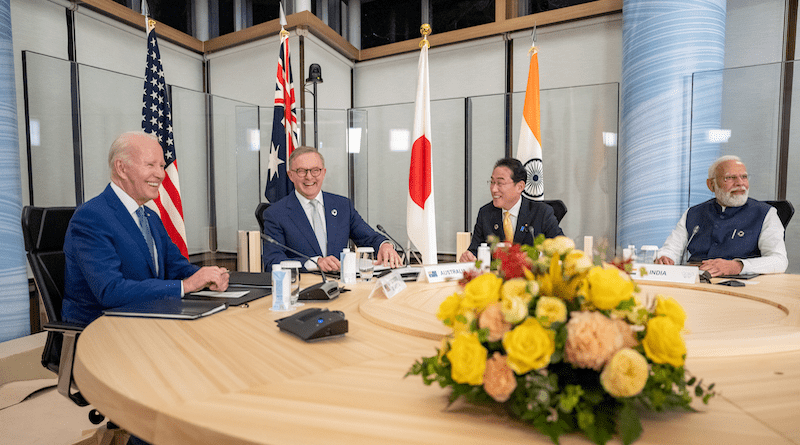Modi’s Address At G-7 Alludes To Tension In Taiwan Strait – OpEd
India’s nuanced yet clear and consistent stance on Taiwan Strait can be deciphered and inferred from Prime Minister Narendra Modi’s address at the recent G-7 summit in Hiroshima.
The allusion to tension in the Taiwan Strait and China’s sabre-rattling was very much discernable when he pitched for raising voice collectively against unilateral attempts to change the status quo asserting that any tension and dispute should be resolved peacefully through dialogue and diplomacy. The message is loud and clear to China and its belligerence not only in the Line of Control (LAC) in the India-China border; but also in the South China Sea, East China Sea, and, more importantly, Taiwan Strait.
India-Taiwan relations have been growing steadily notwithstanding the lack of diplomatic relations between two vibrant democracies. India’s response to the tension in Taiwan Strait has been muted. When turbulence surfaced in the Taiwan Strait and China indulged in live-fire military exercises and violated the median line in August last year in the wake of the visit of Nancy Pelosi to Taiwan, the spokesperson of India’s Ministry of External Affairs articulated India’s nuanced response which was prominently reported and commented in Taiwanese media. India urged restraint and avoidance of unilateral action to change the status quo. India also bemoaned the “militarization of the Taiwan Strait”.
Yet another instance of India’s support to Taiwan is India’s outreach to the South Pacific Island nations some of which are Taiwan’s diplomatic allies like Nauru, Palau, and Marshal Island, at a time when China’s footprints in the Pacific islands have become more pronounced with China and Solomon Island signing the security agreement raising concerns. During his just-concluded visit abroad, Modi also co-chaired and addressed the 14 island nations Forum for India-Pacific Island Cooperation Summit on 22nd May in Papua New Guinea.
Discernable observers could see the elephant in the room and India’s commitment to a free, open, and inclusive Indo-Pacific which is seamlessly connected with Taiwan Strait. He also stressed respect for the sovereignty and territorial of all countries. It is no coincidence that on the day Modi addressed the 3rd Forum, the US also signed a defense pact with Papua New Guinea giving access to forces to the island’s airfields to checkmate China’s growing clout in the region. Papua New Guinean’s location just north of Australia makes it strategically significant which riled China. The pact provides a framework to help improve security cooperation, enhance the capacity of Papua New Guinea’s defence forces and increase regional stability. While Beijing frowned upon the pact as a ‘geopolitical game’, Russia criticized the G-7 as an incubator for anti-Russian and anti-Chinese hysteria.
After the Russian invasion of Ukraine, when there are concerns that China would be tempted to invade Taiwan, in a significant strategic posturing Prime Minister Narendra Modi on the margins of the G-7 Summit meeting met Ukrainian President Zelensky and said that India would do whatever it can to end the war in Ukraine. This articulation has traction for Taiwan in view of growing ties between Taiwan and Ukraine. In fact, India has been pursuing a very calibrated approach to Ukraine striking a fine balance between its long-standing strategic ally Russia and the US, with whom India’s strategic partnership is enhanced to a ‘global strategic partnership’.
India’s principled position on the complex Ukraine imbroglio was articulated earlier in a carefully worded statement during the voting of the US-sponsored UN resolution deploring the Russian aggression against Ukraine. It said, “We urge that all efforts are made for the immediate cessation of violence and hostilities. We are also deeply concerned about the welfare of the Indian community, including a large number of students, in Ukraine. The contemporary global order has been built on the UN Charter, International law, and respect for the sovereignty and territorial integrity of states. All members need to honor these principles. Dialogue is the only way to settle disputes… It is a matter of regret that the path of diplomacy was given up. For these reasons, India has chosen to abstain from the resolution.” In fact, India’s abstention in a US-sponsored UN resolution deploring the Russian invasion of Ukraine should be seen in conjunction with this statement, and not in isolation.
Be that as it may, the G-7 Summit has reiterated once again its firm commitment to Taiwan and to a rule-based world order. Now more than ever before, the democratic world including India, are resolute in their resolve to safeguard democracy and human rights the world over.
(The writer is a Delhi-based foreign policy analyst and a Taiwan fellow in 2022)

